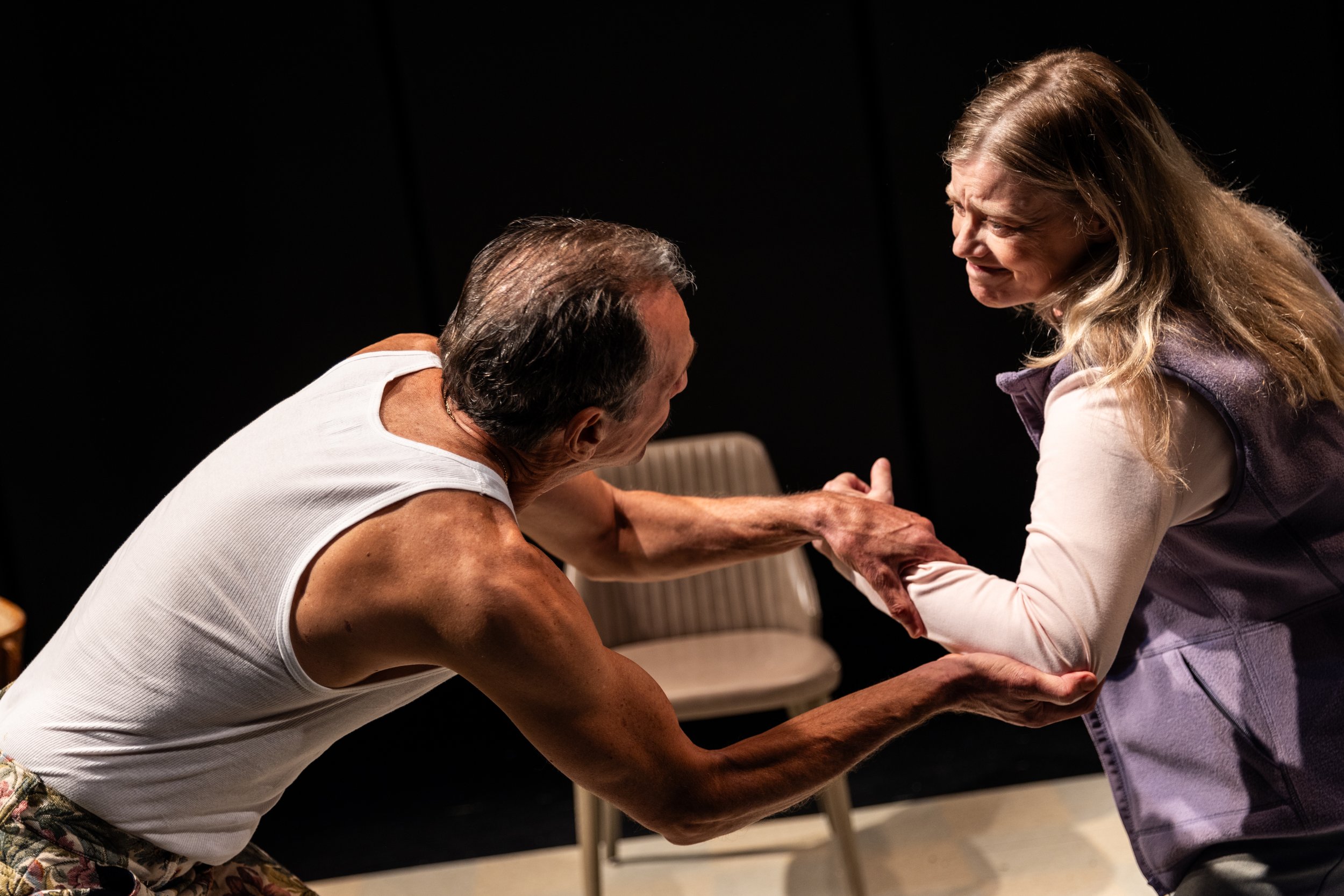No Good Things Dwell in the Flesh by Christina Masciotti premiered at the Jeffrey and Paula Gural Theatre at A.R.T./NY Theatres in September 2023 starring Kellie Overbey, Carmen Zilles, T. Ryder Smith and featuring Jeffrey Brabant, Megan Lomax.
A master Russian tailor struggles to convince her assistant to take over her business as she loosens her grip on the material world. When her deranged ex-boyfriend begins to stalk her in her shop, she’s forced to reconsider what her legacy can be.
Director Rory McGregor
SELECTED PRESS
“Inside an unassuming storefront somewhere in Queens is a woman you wouldn’t notice if you saw her on the street. The drape, fit and feel of clothes are her passion and her living, but her own outfit is pallid, frumpy — a kind of camouflage.
This is Agata, who at 64 is a self-taught tailor with the skill of an artist and an unforgiving eye. When her apprentice, Janice, shows off a photo of her new fiancé, the unevenness of his pant legs is a flagrant red flag.
“If you’re ignorant on pants, you’ll be ignorant on wife,” says Agata, a brusque Russian immigrant who married the same man twice by the time she hit 30, divorced him for good, then built an independent life. “Why you wanna take care of this loser?”
In Christina Masciotti’s keen and unflashy new play, “No Good Things Dwell in the Flesh,” .. Agata — a survivor whose wariness of men and their havoc is a defining stance... has had only one vacation. So maybe it’s weariness that makes her hope that the talented but unserious Janice… — a student at the Fashion Institute of Technology who already has a business degree — could be a worthy successor, someone Agata might simply give her thriving business to.
“No Good Things” is interested in what it means to lose a business that has quietly woven itself into the fabric of a neighborhood. That’s a resonant concern these days, as so many urban storefronts sit vacant.
Masciotti… is also characteristically drawn here to the richness of language, Agata’s in particular. As when she tells Janice, “The heart shape is kind of my enemy shape.” Or when she orders Vlad..., the handsome but unstable ex who tracks Agata down: “Stop creating all this situation.”… Agata, who cares about him still, wants only to keep her distance from him, and from men in general. Thus, I think, her dowdy get-up, hiding her form.
That’s another thing this play is about, though: the siren song of men and coupledom. Agata has spent her whole adult life trying not to get shipwrecked on those rocks.” Laura Collins-Hughes, The New York Times (Critic’s Pick)
“A playwright’s dream! And Masciotti has the ear for it. As a woman with piles of hard-earned experience, and as an immigrant and a service worker who has frequently been looked right through, Agata has plenty to say, and Masciotti skillfully renders her distinctive way of saying it. I sometimes found myself thinking of Alex, the criminally charming translator who narrates Jonathan Safran Foer’s Everything Is Illuminated. The novel’s vitality comes from Alex’s voice, with its buoyancy and confidence, its slightly jangly English and wonky figures of speech. Agata would no doubt class Alex as she does “taller men”—“more stupid. Certain amount proud of themself. For nothing.”—but her own particular idiom is likewise the bedrock and the delight of her author’s story..
If a play is for the most part powered by a single and singular voice, then it needs an actor who can provide that engine — and Overbey can. She flows through Agata’s outpourings of opinion and pronouncement at speed (which is necessary to give them their bite and their humor), and she furrows her brow and hunches her shoulders just the right amount for a woman who’s usually bent over a sewing machine… No Good Things catches Agata at a contemplative moment. She senses the end of her career looming, and she’d like to pass on her shop to Janice, in whom she sees talent and potential. But poor Janice isn’t just talented — she’s also 30 and single, nervous about those things, and dangerously desperate for affection…The sad incompatibility of Agata’s and Janice’s individual yearnings is the real substance of No Good Things. …It brings Masciotti back to her happy place—the detailed observation of character…” Sara Holdren, New York Magazine/Vulture
“Christina Masciotti places a captivating character… center stage… Agata, the heroine, is… a woman of decision, surprised by nothing life throws at her, and ready to roll up her sleeves to deal with any eventuality …she’s fascinating…Agata is a steady source of crisp, acidic amusement. A Russian tailor operating out of a shop in Queens, she is both a wizard and a kind of Slavic Ann Landers, handing out bitter life lessons culled from her own dark history.. she makes mincemeat of anything that carries a whiff of nonsense; her accent thick as borscht yet thoroughly intelligible, carries its own whiff of doom. To a young associate mooning over Hugh Grant, she snaps, “That guy? He’s British asshole like Winston Churchill…Dispensing altogether with the idea of romance, she pronounces, “Instead men, I prefer spend time with my cat. Very independent, too. Don’t want to be held too much. I respect that.” - Lighting and Sound America (September 2023)
No Good Things Dwell in the Flesh is made possible by the New York State Council on the Arts with the support of the Office of the Governor and the New York State Legislature. Funding has been made possible by The Puffin Foundation, Ltd., a Foundation for Contemporary Arts Emergency Grant, and the generous contributions of individual donors.
Performance space for this production was subsidized by the A.R.T./New York Theatres Rental Subsidy Fund, a program of the Alliance of Resident Theatres/New York (A.R.T./New York). Production design support provided by the Edith Lutyens and Norman Bel Geddes Design Enhancement Fund, a program of the Alliance of Resident Theatres/New York (A.R.T./New York).
Development of No Good Things Dwell in the Flesh was supported with readings and workshops provided by The New Group, Baryshnikov Arts Center, Women’s Project Theater, Duke University Theater Previews Lab, and the Yocum Institute for Arts Education.













